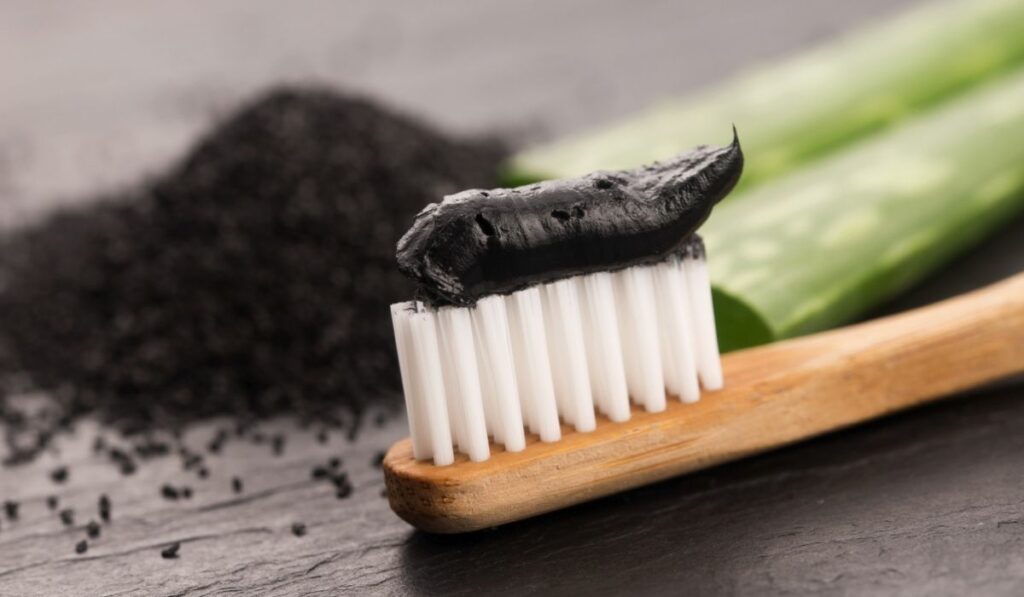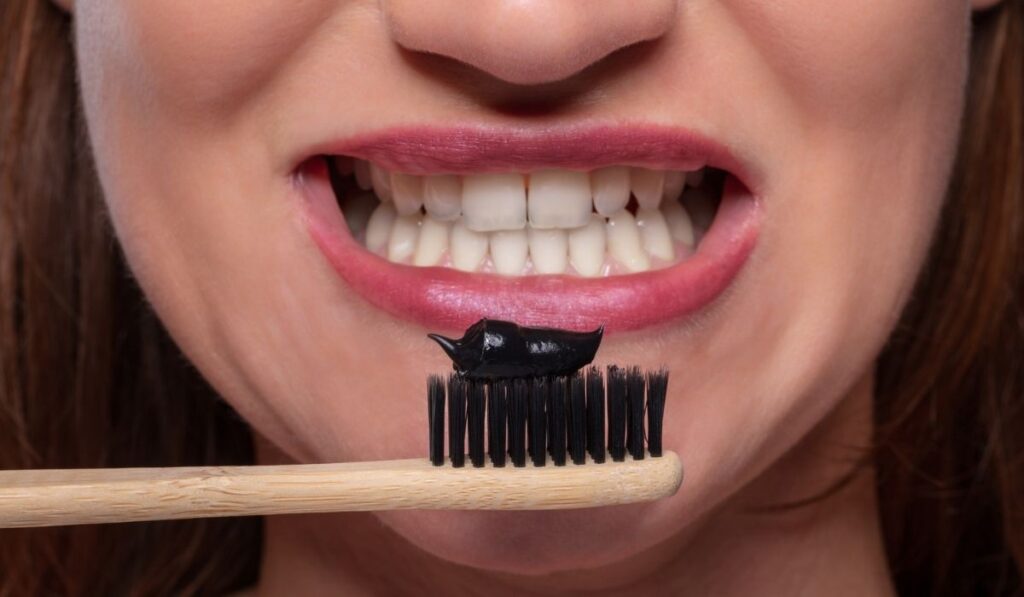You’ve probably seen activated charcoal products all over social media lately. These products are all the rage in the beauty and cosmetology sphere. But as is the case with most health and beauty trends, you have to wonder: Is this thing actually as effective as people say it is?
Charcoal and charcoal-based toothpaste can be used safely in moderation. Charcoal has an abrasive and gritty texture, which can help remove stains and plaque, but overuse can cause damage. Charcoal toothpaste can chip away at your enamel, resulting in more cavities, sensitivity, and other issues.
You may be wondering what the use of charcoal toothpaste is if it’s going to cause more harm than good. It’s a fair question. However, these products do have some potential benefits that should be considered. Here’s what you need to know about activated charcoal and how it affects your teeth.
Is Charcoal Bad for Your Teeth?

Generally speaking, the charcoal found in oral health products like Colgate Activated Charcoal Toothpaste (on amazon) can be safe for your teeth when used in moderation. The striking black color of this toothpaste is also eye-catching!
The primary concern when using charcoal is that it’s very abrasive. Although the material is effective at removing surface stains and plaque, the gritty texture can do more harm than good.
If misused, you run the risk of degrading your enamel, and losing your enamel can result in cavities, sensitivity, and other adverse health effects.
How to Safely Use Charcoal for Teeth
Although activated charcoal in toothpaste may help remove surface stains and plaque, there are some precautions and risks you should be aware of.
Despite a lot of talk that suggests otherwise, there isn’t any solid evidence that charcoal has any effect on stains below your enamel or that it has a natural whitening effect. Here are some tips if you plan to use charcoal-based products:
Don’t Use It Everyday
Charcoal can be too abrasive on your teeth and degrade your enamel over time. Loss of tooth enamel can lead to an unpleasant yellow hue because as the enamel gets thinner, the next layer of dentin becomes more prominent.
For this reason, you shouldn’t be using charcoal toothpaste every day — practice moderation when using this type of product.
Use Trusted Brands
Although it can be tempting, avoid making your own DIY charcoal solution. Using trusted toothpaste brands will reduce the risk of damage, sensitivity, and tooth decay. Brands like Crest and Colgate are well known and recommended by dentists across the nation.
Be sure to do your due diligence before purchasing a product.
Look for Brands That Contain Fluoride
If you’re shopping for charcoal toothpaste, look for brands that contain fluoride. Fluoride can strengthen your tooth enamel, resulting in fewer cavities and decay. There have been some studies linking charcoal toothpaste to increased tooth decay, so practice caution as always.
Use a Soft-Bristle Toothbrush
Be sure to use a soft-bristle toothbrush If you’re going to be using charcoal toothpaste. Activated charcoal can have an abrasive texture. Using a soft bristle toothbrush can help reduce the risk of enamel damage, decay, and sensitivity.
Speak With Your Dentist
Speak with your dentist beforehand if you’re considering purchasing charcoal toothpaste. Your dentist will know what’s right for you, your teeth, and your oral hygiene. They can provide the best advice on how to approach charcoal products.
What Is the Best Charcoal Toothpaste?

The charcoal toothpaste market is vast and can be confusing to navigate. Knowing which companies to trust can be difficult with both generic drugstore finds and premium brands on the market. Here are a few brands you should consider when shopping for charcoal toothpaste:
Colgate Activated Charcoal Toothpaste
Colgate Activated Charcoal Toothpaste (on Amazon) is a true competitor amongst drugstore finds. The affordable price point doesn’t make it any less effective than other brands.
The added charcoal ensures a subtle brightening effect over time, while the fluoride and micro-cleaning crystals strengthen your teeth. The light grey hue won’t leave your sink a mess, and the minty scent will keep your breath smelling fresh.
Crest 3D Whitening Therapy Charcoal Deep Clean Toothpaste
If you’re team Crest, look no further than their Charcoal Deep Clean Toothpaste (on Amazon). This invigorating mint paste has a subtle black stripe of charcoal, resulting in stain-fighting benefits with less harm.
The added fluoride works to keep your enamel and gums healthy for the long run. Crest’s 3D whitening technology has proven to be effective, so you can rest assured that your smile will be whiter in no time.
Hello Oral Care Activated Charcoal Teeth Whitening Toothpaste
Hello, Oral Care (on Amazon) is the best choice if you’re going fluoride-free. This all-black paste may leave your sink and counter a mess, but you can be sure you’re getting what you pay for.
The certified organic charcoal is made from sustainable bamboo, resulting in less odor, fewer stains, and a whiter smile. With added coconut oil, mint, spearmint, and peppermint, you know your teeth will be plaque-free, and your breath will be smelling nice and clean.
Do Dentists Recommend Charcoal for Whitening Teeth?
The jury is still out on how beneficial activated charcoal can be for whitening and strengthening teeth. However, there are some factors you should keep in mind before you purchase a new toothpaste.
The American Dental Association (ADA) has yet to find evidence that charcoal toothpaste is effective for whitening teeth. In fact, these products may do more harm than good when misused.
Activated charcoal is gritty and abrasive. Although this can be nice for fighting stains and plaque, the texture can chip away at the outer layer of your tooth called the enamel. Loss of enamel is permanent and can cause sensitivity, discomfort, and other adverse health consequences.
What’s the Verdict?
The science surrounding charcoal toothpaste can be confusing to understand. More research and studies need to be conducted before we can truly understand how effective these products are.
When used in moderation, charcoal toothpaste don’t seem to have adverse health effects. Be sure to speak with your dentist before purchasing any products to find out what’s suitable for you and your oral hygiene.


